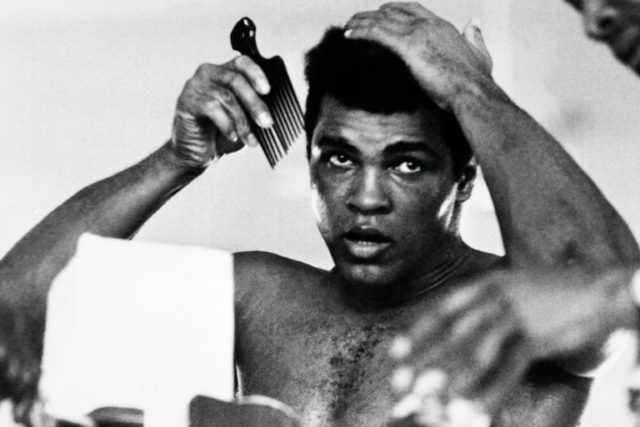Ted Williams lost nearly five seasons to World War II and the Korean War. We look at the 521 home runs and .344 lifetime batting average and think: what might have been? Muhammad Ali lost more than three years in his prime to the Vietnam War, and some also ask: what might have been?
Others wonder: what on earth, specifically in the Western Hemisphere beneath the 50th parallel but above the 30th, changed?
The similar appreciation for their very different approaches to war reflects a massive shift in the world, and America, over a fairly short period of time. Americans admired Ted Williams for his bravery serving as a fighter pilot. And they admired Muhammad Ali for his “bravery” in standing up to the draft board. The former activity resulted in Chinese and Koreans trying to shoot the left fielder out of the sky in 39 ground-attack missions flown during the Korean War; the latter activity led to inactivity, with American pugilist panjandrums barring Ali from the boxing ring from 1967 until 1970.
Ted Williams lost more than he gained from his stance. Muhammad Ali gained more than he lost from his.
But the headlines in the wake of the death of the only three-time lineal heavyweight champion tell a different story. The Huffington Post blares “Muhammad Ali Risked It All When He Opposed the Vietnam War,” while the New York Times proclaims, “In Muhammad Ali, an Example of a Truer Kind of Bravery in Sports.”
Risked it all to keep rising off that stool in Manila? Definitely. Brave for stepping into the ring with big punchers Sonny Liston, George Foreman, and Earnie Shavers? Sure. Courageous for living the high life in a mansion while others died in the jungle? No.
The headlines may call him a hero for dodging the draft. But common sense calls him a hypocrite. Muhammad Ali beat up other men, mostly other men of color, with a Chuck Wepner and Joe Bugner thrown in every so often, for a living. Like Ali, several of his opponents—Floyd Patterson, Jimmy Ellis, Jerry Quarry—degenerated slowly toward death because of the shots they took in the ring. He called himself a conscientious objector to war. But he was no such thing. He believed in wars fought on Allah’s, not Uncle Sam’s, behalf.
“War is against the teachings of the Holy Koran,” he remarkably claimed. “I’m not trying to dodge the draft. We are not supposed to take part in no wars unless declared by Allah or the Messenger [Elijah Muhammad]. We don’t take part in Christian wars or wars of any unbelievers.”
Ali called “white slave masters” his real foe. He maintained, “The real enemy of my people is here,” in America, the country where Southern white policemen taught him to box after a thief stole a birthday-present bicycle from 12-year-old Cassius Clay and an overwhelmingly white audience of fans made him a millionaire by packing arenas. Joe Louis and Sugar Ray Robinson went when their country called during World War II. Ken Norton earned an honorable discharge from the Marines around the time his most famous foe claimed conscientious objector status. But Ali, under the sway of an anti-American sect consumed by internecine violence and as far from pacific Quakers as one gets on the religious spectrum, maintained an objection to war on grounds of conscience.
Ali earned fame fighting then said he wouldn’t risk his life fighting because it conflicted with his religious beliefs. The broader religion he followed then, as now, inspired scores of conflicts around the world. But the heavyweight champion of the world said his faith wouldn’t allow him to partake in violence. That, like Ali, was rich.
Like Ali, Ted Williams initially didn’t want to go to war. He delayed induction during the Second World War, claiming that as the only breadwinner for his mom he deserved lenience. After missing three seasons for mostly stateside military service, he resented his recall to actually fight in Korea. Like the gregarious Ali, the cantankerous Williams preferred playing sports to fighting wars. But his country called, and he answered. Ali talked back, but the result—losing peak career years—was the same. As was, strangely, the reaction from many to both men’s decision. Many Americans regarded draft dodging the way their forbears regarded answering the call: as an act of bravery. What a long, strange trip, indeed!
The potential not made actual nudges us to fill in the blanks with the best of the Splendid Splinter and the Louisville Lip. So, 56-5 and .406 improves to something even more spectacular in our fantasies. But the reality of these men proved very different. Ted Williams went abroad and became an American hero. Muhammad Ali stayed home and became an international icon.
The player quietly left the games behind for something real. The fighter loudly refused to fight.
“My conscience won’t let me go shoot my brother, or some darker people, or some poor hungry people in the mud for big powerful America,” Ali explained of his refusal to go to Vietnam. “And shoot them for what? They never called me n—–r, they never lynched me, they didn’t put no dogs on me, they didn’t rob me of my nationality, rape or kill my mother and father.”
But they did kill their fellow countrymen and his fellow Americans, close mosques, outlaw religious schools, and send more than 50,000 Muslims fleeing after the war, and take away basic civil rights in the name of Communism. The Greatest lived in comfort while other guys like him—despite his poetic, verbal prowess he graduated 376th out of 391 in his high school class and scored a 78 on an IQ test—fought and died in Vietnam. This doesn’t make his position wrong or right. It does make him less than heroic here.

COMMENTS
Please let us know if you're having issues with commenting.